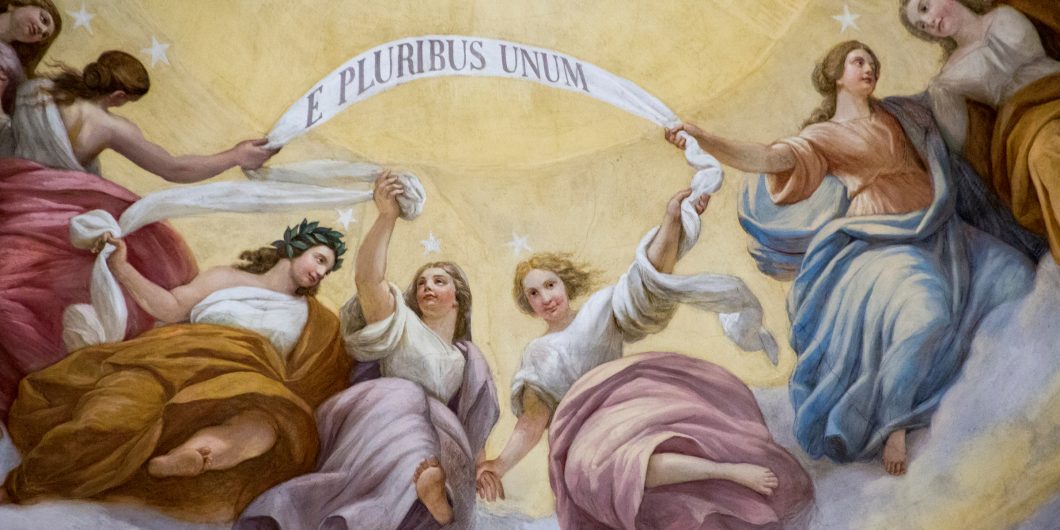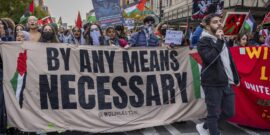The response on American campuses to Hamas' brutality might prompt donors to seek reform. But what is the way forward?
Identity, Patriotism, and Education
Editor’s Note: This essay is part of a symposium on identity politics sponsored by the Ryan Foundation.
Identity, like love, is a many-splendored thing, and for some of the same reasons. What could be simpler than the condition of being what one is? And yet, what seems so simple at first turns out to be so complex. The question “Who are you?” or alternatively, “Who am I?” can be surprisingly difficult to answer. The response will depend on the context in which the question is asked, and what we want to learn by asking it. We will ask it differently of a stranger who suddenly appears at our door, or of someone whose name we know only from seeing it in the papers, or when asked to sum up the complexity of someone we have known intimately for many years. In fact, the more inclusive the answer, the more formidable the task of giving a public rendering. There is an infinitude that even the best elegist leaves out.
A vivid illustration of that point, taken from a time very different from our own, has been provided by the classicist Angelos Chaniotis. He tells the story of when, around 50 BCE, the city of Aphrodisias in Asia Minor decided to honor a prominent citizen with a public funeral, using the following pronouncement:
Hermogenes, son of Hephaistion, the so-called Theodotos, one of the first and most illustrious citizens, a man who has as his ancestors men among the greatest and among those who built together the community and have lived in virtue, love of glory, many promises of benefactions, and the most beautiful deeds for the fatherland; a man who has been himself good and virtuous, a lover of the fatherland, a constructor, a benefactor of the polis, and a savior . . .
Note that for purposes of this proclamation, Hermogenes’ identity had to include not only his name and nickname (“gift of the gods”), but mention of his father, his ancestors, his social niche, and his public achievements. His identity is about his origins as well as his deeds and is almost entirely a function of his life as a public person. Identity is explicitly linked to a hierarchical social order rooted in the past, with a settled politics of recognition.
Yet some eighty years later, Jesus rang a hugely influential change on this. “Who do people say that I am?” he asked his disciples, in the Gospel according to Mark. Their initial answers to him—Elijah, John the Baptist, etc.—were all off base, cases of mistaken identity or wrongful recognition. And then he asked the disciples more intently, “Who do you say I am?” In so doing, he was forcing upon them a distinction between his muddled and indeterminate image in the public mind, and his yet-to-be-recognized identity as the Christ, whose powerful and radiant mission and meaning existed entirely apart from the false ascriptions of the people around him. His divine example prefigured an understanding of the Self, first emerging fully in the work of Augustine, as an inward wholeness that ultimately shook off the determining constraints of natality and origins to become what it was all along. Ye must be born again.
We moderns are somewhere in the middle of this. We want recognition, of course, but we also insist on being the proclaimers of our own identity, the tellers of our own tales. From Benjamin Franklin to Barack Obama, our most notable American autobiographers have concentrated less on asserting the worthiness of their fathers and mothers than on relating the story of how they sought to distinguish themselves from their origins and refashion themselves. Such writers incorporate their lives into the great modern drama of individuation, of making one’s way in the rough and tumble of a wide and sometimes hostile world and winning a measure of autonomous freedom and self-realization in the process.
Yet autonomy, much like the Self that purports to exercise it, turns out to be an elusive and unreliable god-term, one that never delivers what it promises, if one makes the mistake of thinking that Jesus’ command can ever be immanentized. For one thing, even the most energetically “unencumbered self” comes into the world already enmeshed in linguistic, social, intellectual, and institutional frameworks that the ideal of autonomy already presupposes and rests upon. We cannot erase the sway of all the things that have already conditioned us, beginning with the many biological fixities and dependencies that are part of our coming into the world as mammals. It actually is very hard to imagine what autonomy would mean, if it were to be taken to mean a completely unconditioned freedom.
But that is not all. Alongside our desire to be free is our powerful need to belong, to experience membership, to feel in harmony and solidarity with others, and, like Hermogenes, to have a favorable audience for our endeavors. Even the most incorrigible egotist wants to be admired by others. The pseudo-hard-boiled 1980s slogan, “He who dies with the most toys wins,” inadvertently discloses that fact, since there can be no winning without a race, and a victor’s circle surrounded by admiring onlookers. The same goes for those who claim that they don’t give a damn what others think. The desire for honor and lasting recognition in the eyes of others—a desire for what would have been called kleos in the city of Aphrodisias—has lost none of its power, even if this need to belong is somewhat at odds with the liberatory preoccupations of so much modern thought, bent as they are toward the destabilization of received social meanings, of programmatically not giving a damn. This makes it hard to work backward toward something that commands common and universal respect.
National Identity and Identity Politics
There are many reasons why the politics of identity has gained such strength in our times, and those reasons vary from group to group, and identity to identity. But one should begin with that need to belong, and to belong to something specific and distinct, something that distinguishes oneself from the lonely crowd of a deracinated mass society.
But more importantly, the politics of identity has grown beyond proper bounds because the national ethos has faltered and faded, leaving a vacuum to be filled. The identity group can serve, as all intermediate forms of organization do, as a mediating institution between the individual and a large, impersonal, and highly transactional state. It can be a vehicle of political protection and a source of bargaining power for those who feel the benefit of it. That is not always a bad thing, and can in fact have positive aspects, as a feature of a well-functioning pluralism. Arguably the ward-heeling ethnic urban politics of generations ago, for all of its corruption, was helpful to the process of ethnic inclusion and fuller political engagement, so long as there is a strong national ethos counterposed to it.
But if that national ethos disappears, if the unum gives way entirely to the plures, then the politics of identity becomes utterly poisonous and Balkanizing, creating a world more like that of Hobbes than that of Madison. Or more precisely, like that envisioned in Frantz Fanon’s Wretched of the Earth, which argued that, since the major weapon of the colonizers was the imposition of their image of the colonized on the subjugated people, freedom was only to be had by purging themselves of these denigrating self-images. Under such a logic, our common culture becomes a form of tyranny, and institutions dedicated to the perpetuation of that culture become seen as agents of oppression.
Identity is not a riddle to be solved, or a totem toward which we must bow, but is instead a path that we make by walking it. If we are willing to walk that path, we discover that the answer to the question “who are you?” is something much larger than the sum of our various ascriptive identities.
It is not clear whether we have reached that point. But it is clear that we Americans need to realize afresh the necessity of that national ethos, of knowing our history, and yes, knowing it as an essential component of our civic education, of the formation of our identities as citizens. We are not a people bound together primarily by blood and soil. Instead, we are a people with origins in many bloods and soils, linked by shared aspirations and principles embodied in shared institutions, and embedded in a shared history, with its shared triumphs and shared sufferings. A healthy pluralism must be able to presume that commonality as a precondition.
These things must be learned, and there is a growing danger that we are failing to pass along the knowledge of them to our posterity, with untold consequences. We have neglected an essential element in the formation of citizens when we fail to provide the young with an accurate, responsible, and inspiring account of their own country—an account that will inform and deepen their sense of identification with the land they inhabit and equip them for the privileges and responsibilities of citizenship. We should overcome our learned distaste for the word “patriotism” and recover the idea that the study of history, particularly for the young, is about the formation of citizens.
Liberal Education and Citizenship
This is, or ought to be, at the core of what we mean by “liberal education,” a notoriously imprecise term, but generally not associated with the idea of civic education. But it should be. Instructing people in the liberal arts is not just a matter of imparting certain analytical techniques, or a particular body of knowledge, or reading a lengthy list of books, or concepts with which one must be demonstrably conversant—although all those things will contribute in indispensable ways to the pursuit of a liberal education.
The chief public benefit of liberal education is the formation of a particular kind of person, a particular kind of citizen, who is equipped for the truth-seeking deliberation and responsible action a republican form of government requires. It helps them see that freedom as a form of rational self-government, as a regimen of risks and rewards, an intellectual and moral freedom grounded in a healthy combination of membership and inquiry, of reverence and criticism, of belonging and independence. It is a freedom that releases us from the unquestioned tutelage of our past, and the sometimes crushing weight of our ascriptive status—race, sex, ethnicity, whatever it may be—and provides us with an Archimedean point where we can scrutinize each and every one of the world’s givens. But it does so in a way that enables us, ultimately, to draw sustenance from the past rather than make us entirely disdainful of it, or worse, entirely alienated from it. The best education does all these things at the same time.
The proper end of liberal education is that of substituting informed loyalties for blind ones, and substituting conscious reasonableness, and un-coerced love, for fear and dependency and superstition and reflex action. It is a freedom that comes of seeing all that one has formerly known in a larger arena, within a larger frame, as a part of a larger reality—to see it all, as we say, in a new light. This includes taking a fresh view of the elements in one’s given “identity.”
Such a person has an ability to draw back from the flow of events and reflect upon them, the ability to consult the voice of reason and the wise testimony of the past. Such a person has the cognitive and moral strength to see the world as it is, and not be fooled into mistaking a succession of images projected onto the walls of caves, or conjured on screens, for reality, no matter how large the images or how pervasive their presence. And no matter how many proximate others have been gulled or deceived into believing in those images.
Hence Plato’s great image of liberation, the allegory of the cave, remains at the core of education, even if it does not constitute the whole of it. Before we can do anything truly magnificent and lasting, in art or craft or love or statesmanship, we too must be drawn out of our various caves. The obsession with identity is just such a cave. So are the prejudices of our childhood, the sirens of propaganda, and the enchantments of virtual experience, all of which we need to be liberated from before we can accomplish anything worthwhile.
Note that being liberated from them is not at all the same as the renunciation of them. When T.S. Eliot spoke in “Little Gidding” of life’s journey leading us to “arrive where we started / and know the place for the first time,” he might as well have spoken of “loving it for the first time,” with the uncoerced capacity for love that comes with a mature freedom. The same applies to all the other elements of natal or group identity. The restoration of the unum does not mean that the plures should be jettisoned. That is a form of self-diminishment which America, at its best, does not ask of us. But working out the details of that relationship…that is up to each of us.
The cave specializes in abstractions and artifice, and we are frighteningly susceptible to them. Identity politics is one of those forms of abstraction, reducing the complexity and multiplicity of the individual person to a single factor—a self-diminishment that enhances political effectiveness or social advantage at the expense of the complexity of the individual. The digital environment in which we now swim, and sometimes drown, magnifies such thinking to a pathological degree. An unhealthy proportion of our experience has come to be mediated and directed and channeled and simulated by the artificial instrumentalities we use to apprehend the world, and by what others instruct our imaginations to believe such a world might be.
Such a tendency toward abstraction and artifice carries with it immense dangers: for our ability to think clearly and attentively, for our ability to use our imaginations with vividness, intensity, and independence, and for our ability to see what is plainly in front of us and build our lives around those whom we know and touch and live with every day, face to face. It also threatens to undercut the patterns of restrained and civil public deliberation that a genuinely democratic society requires. This tendency toward immersion in mediated experience inhibits the full flourishing both of our inner life and the mutuality of our common life. It can easily become a form of cognitive imprisonment. It need hardly be said how greatly the current regime of antiseptic social distancing has added to our self-diminishment and placed obstacles in the path of its being overcome. But even when that is past, the danger will remain.
In the years to come, then, it will be a greater and greater part of a genuine liberal education to counteract these confinements imposed upon us by our ghostly caves, including the caves of “identity,” and restore us to ourselves by leading us out of ourselves—restoring our ability to hear and see and touch the earth for ourselves, to gaze at the night sky for ourselves, to recover the lost art of conversation, and to extend and explore together the real possibilities of our human freedom. Identity is not a riddle to be solved, or a totem toward which we must bow, but is instead a path that we make by walking it. If we are willing to walk that path, we discover that the answer to the question “who are you?” is something much larger than the sum of our various ascriptive identities. It can include them, and draw on them respectfully, even as it rises above them.



